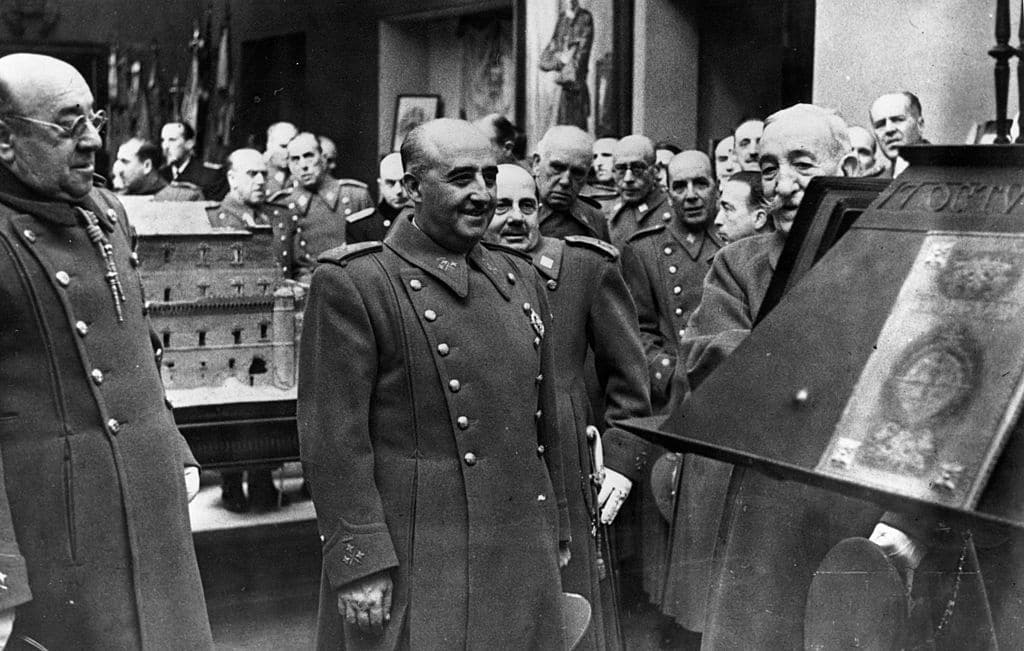I have been reading of the Oscar Schindler-like exploits of my friend and Herald director Brooks Newmark, who has not only taken in a Ukrainian family into his Belgravia house but also, through his charity Angels for Ukraine, has rescued over 21,000 women and children from various warzones. Having lunch with Brooks the other day made me recall how so often the theatre of war throws up unsung heroes, and occasionally saints.
My convert late father, Wing Commander Archibald James (he was later appointed KBE), was a Conservative Member of Parliament who visited both sides during the Spanish Civil War and met some of Franco’s generals. He also once shared a flat with Kim Philby and an office with the Duke of Windsor (although not at the same time), and won a Military Cross in the First World War.
When Sir Samuel Hoare (a former Foreign Secretary) was appointed British Ambassador to Spain in 1940 and given the job of trying to keep Spain neutral and avert the risk of the Germans taking Gibraltar, my father was appointed First Secretary at the Embassy because of his contacts with Franco’s regime. He was part of a team under Hoare, of which the key members were Spanish financier Juan March and the naval attaché Alan Hillgarth (also later a Catholic convert).
Their job was to bribe Franco’s associates to lean on Franco to keep Spain neutral. At least $13 million was transferred from the British Treasury in New York to March; Hillgarth handled the details once they had identified senior Spanish figures who could be bought off. My father’s job was to approach the generals whom he had met during the Civil War and suggest that they meet Hillgarth. If Franco could be persuaded not to join the Germans they got the money anyway; if he did, they would start a guerrilla war.
My father also worked with the embassy’s “assistant press attaché”, Bernard Malley: an unsung Catholic spy master who belonged in a Graham Greene novel. Imitating the way that the Duke of Wellington had run a network of Catholic priests through the Rector of the Irish College in Salamanca during the Napoleonic Wars, Malley ran a similar network.
As I learned before my father died, they came up with some important intelligence that could have proved deeply embarrassing to Franco had the Spanish joined Hitler in 1940 (a real possibility) – namely that Franco had first cousins who claimed to be Jewish.
My father met Franco’s cousins and later conveyed what they had told him to Winston Churchill and the Spanish Ambassador in London. This dynamite revelation could have derailed the course of the war. Growing up, I knew nothing of it. I attended Stonyhurst College (my American mother was a Catholic) and it wasn’t until years later, when I read Peter Day’s Franco’s Friends and found references to my father’s wartime spying activities, that I became aware of his work.
Thus began a decade of research, in Spain (including meeting Franco’s daughter) and in Cambridge (my father’s Spanish papers are in the Churchill Archives). It emerged that Malley was mysteriously given an MBE in January 1942, whilst only a junior attaché. In 1961 he was appointed CMG, which hinted at his true (but secret) role at the Embassy. Meanwhile, a Spanish professor identified the two cousins, and their motivation for declaring themselves to be Jewish emerged.
Their brother had commanded an airbase in Morocco at the start of the Civil War. He had actively opposed the Nationalists, had surrendered when Franco’s troops stormed the base and had been shot on Franco’s orders. Declaring themselves to be Jewish (as was not uncommon among anti-clericals like best-selling author Jorge Luis Borges) was their revenge. I also found a reference to “Franco’s distant Jewish ancestors” in the valedictory report to the Foreign Office by the first post-war British Ambassador to Spain: in his memoirs he effectively identified Malley as his source.
I had met Malley at his office in the Embassy during my gap year in Spain; he was clearly very religious and had been educated at Cotton College, the former Catholic school in Staffordshire. He had even enrolled as a seminarian at Oscott, but in 1913 realised that he did not have a vocation and moved to Bilbao. He lived in Spain for the rest of his life. When the Spanish Civil War broke out in 1936, Malley adopted three Civil War orphans and organised the evacuation of many Spanish and also British subjects from the Republican Zone.
After his death in 1966, a Spanish Catholic paper reported that during the war Malley had not only run a clerical spy ring out of the Embassy but had also started a medical supply service “to all persons who wished to ask for them”. This private clinic was dubbed the “cell of Padre Bernardo” by the papal nuncio, Amleto Cicognani, who went on to become Cardinal Secretary of State during Vatican II. Whether Malley’s example had any influence on my father’s decision to convert later in his life I do not know, but the Spanish spymaster was the closest thing I have encountered to a modern wartime saint.



